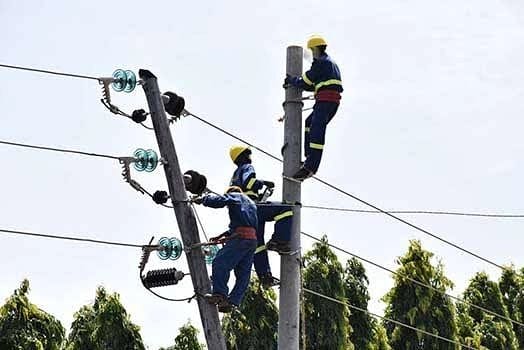NAIROBI, Kenya, Sept 29 – A report by a presidential task force mandated to review the cost of electricity in the country has recommended the reduction of the cost of electricity by over 33 percent within the next four months.
The presidential task force led by John Ngumi Wednesday presented their report to President Uhuru Kenyatta at State House Nairobi following months of deliberations with stakeholders in response to the high cost of electricity for both individual consumers and enterprises.
The high cost of electricity is said to have impeded and affected economic activities, as well as limiting the country’s aspirations of realizing its potential as a middle-income and industrialized country.
The consequence of the proposed interventions is that a consumer who previously spent Sh500 per month on electricity shall by December 31, 2021 pay Sh330 per month.
This cost reduction will be achieved through the reduction of the consumer tariffs from an average of Sh24 per kilowatt-hour to Sh16 per kilowatt-hour which is about two-thirds of the current tariff.
Already, the cost of electricity per unit of power is said to be the highest in five years.
The task force was mandated to, “undertake a comprehensive review and analysis of the terms of all Power Purchase Agreements (PPAs) entered into by the Kenya Power and Lighting Company Limited (KPLC) and develop a suitable strategy for engagement with the Independent Power Producers (IPPs) and lenders, in order to achieve relief for electricity consumers and ensure the long-term viability and sustainability of the energy sector,” reads a section of the executive order by President Kenyatta.
Report Findings
President Kenyatta said that key findings of the report revealed that the vast differential between KenGen and Independent Power Producer (IPP) tariffs and electricity dispatch allocations accompanied by the lack of proper demand forecasting and planning lead to irreconcilable projections as against demand.
The existing risk allocation imbalances between KPLC and IPPs further exacerbated by poor contract management frameworks and an uncoordinated institutional architecture led to enhanced operational costs that were subsequently passed on to consumers.
President Kenyatta has now directed Energy Cabinet Secretary Charles Keter to implement all the recommendations of the Taskforce by December 25, 2021.
Taskforce Recommendation
The Ngumi led task force has recommended the review and renegotiation with Independent Power Producers (IPPs) to secure an immediate reduction in Power Purchase Agreements (PPA) tariffs within existing contractual arrangements while at the same time recommending the immediate cancellation of all unconcluded negotiations of Power Purchase Agreements and ensure future PPAs are aligned to the Least Cost Power Development Plan (LCPDP).
Kenya power is now expected to restructure itself into a commercial entity that is both profitable and also capable of delivering efficient and cost-effective electricity supply to all consumers. while to take leading efforts to formulate related PPA procurement of the Least Cost Power Development Plan (LCPDP).
KPLC is expected to institute Due Diligence and Contract Management frameworks for PPA procurement and monitoring along the lines of the drafts provided by the Taskforce. it is also expected to institute one and five-year rolling demand and generation forecasts and associated models.
The task force further recommended the adoption of standard PPAs and proposed Government Letters of Support (LOS) along the lines of the drafts provided by the task force, easing the undertaking of a forensic audit on the procurement and system losses arising from the use of Heavy Fuel Oils (HFOs).
“In line with the constitutional imperative for transparency in the public sector, KPLC’s annual reports should include the names and beneficial ownerships of all IPPs with which it has contractual arrangements,” read the report.
Cost of Living in Kenya
Since the COVID-19 pandemic struck the country last year, the cost of living has risen exponentially in the country even in the wake of thousands of Kenyans losing their jobs following a strain on the economy.
On September 15, 2021 motorists were forced to dig deep into their pockets after the Energy and Petroleum Regulatory Authority (EPRA) announced changes in prices for the period of September 15 and October 14, 2021.
According to the energy regulator, petroleum prices in Nairobi for Super petrol rose by Sh7.58 per liter, Diesel rose by Sh7.94 per lire and Kerosene rose by Sh12.97 per liter.
“The prices are inclusive of the 8 percent Value Added Tax (VAT) in line with the Finance Act 2018, the Tax Laws (Amendment) Act 2020, and the revised rates for excise duty adjusted for inflation as per Legal Notice No. 194 of 2020,” read a statement from energy regulator.
Across the major counties Kenyans will have to dig deep in order to acquire the valuable commodity.
In Nairobi, the cost of Petrol per litre will be Sh134.72, Diesel Sh115.60 and Kerosene Sh110.82
In Mombasa, the cost of Petrol per litre will be Sh132.46, Diesel Sh113.36 and Kerosene Sh108.57.
In Kisumu the cost of Petrol per litre will be Sh135.13, Diesel Sh116.30 and Kerosene Sh111.54
In Eldoret, the cost of Petrol per litre will be Sh135.13, Diesel Sh116.31 and Kerosene Sh111.54.
The prices had remained unchanged for a period of two months as the government retained subsidies on petroleum products even as crude oil prices skyrocketed resulting in the increase in the cost of importing petroleum products.
Observers now say the increase n fuel prices will have a domino effect on the prices of basic communities as well as affecting normal day life.
Want to send us a story? Contact Shahidi News Tel: +254115512797 (Mobile & WhatsApp)


